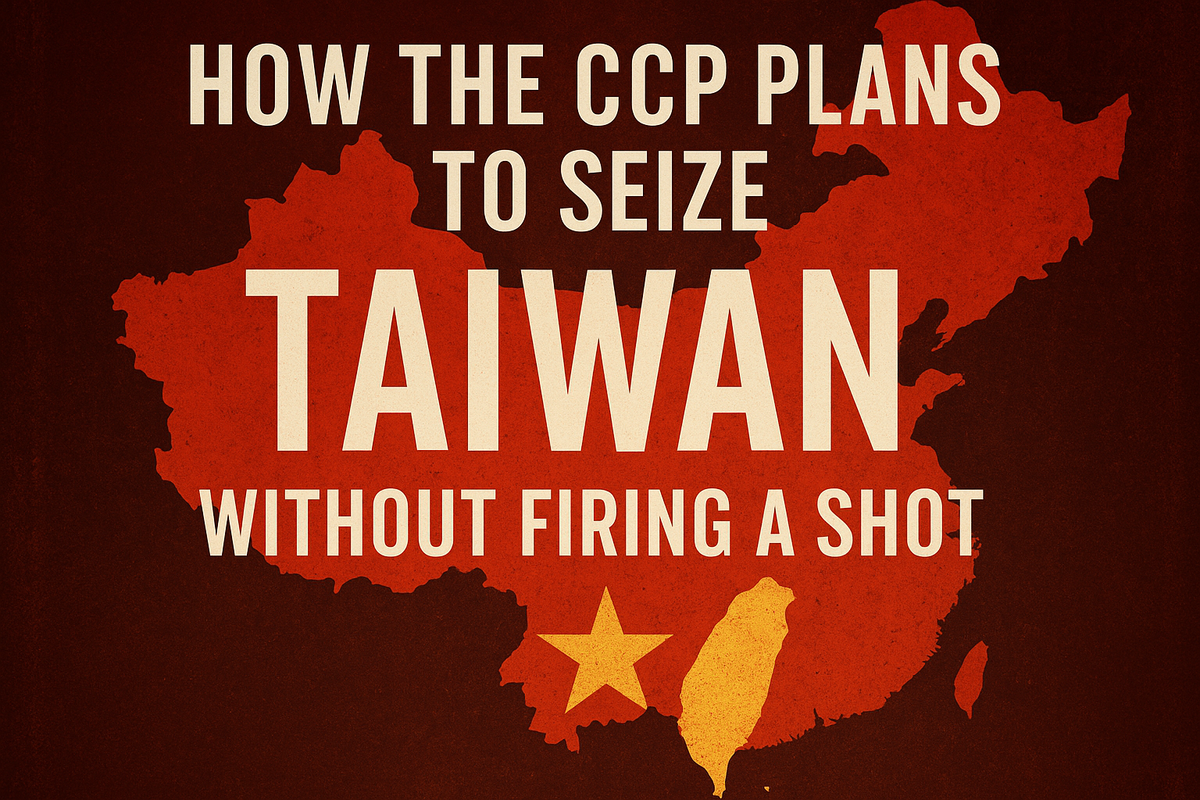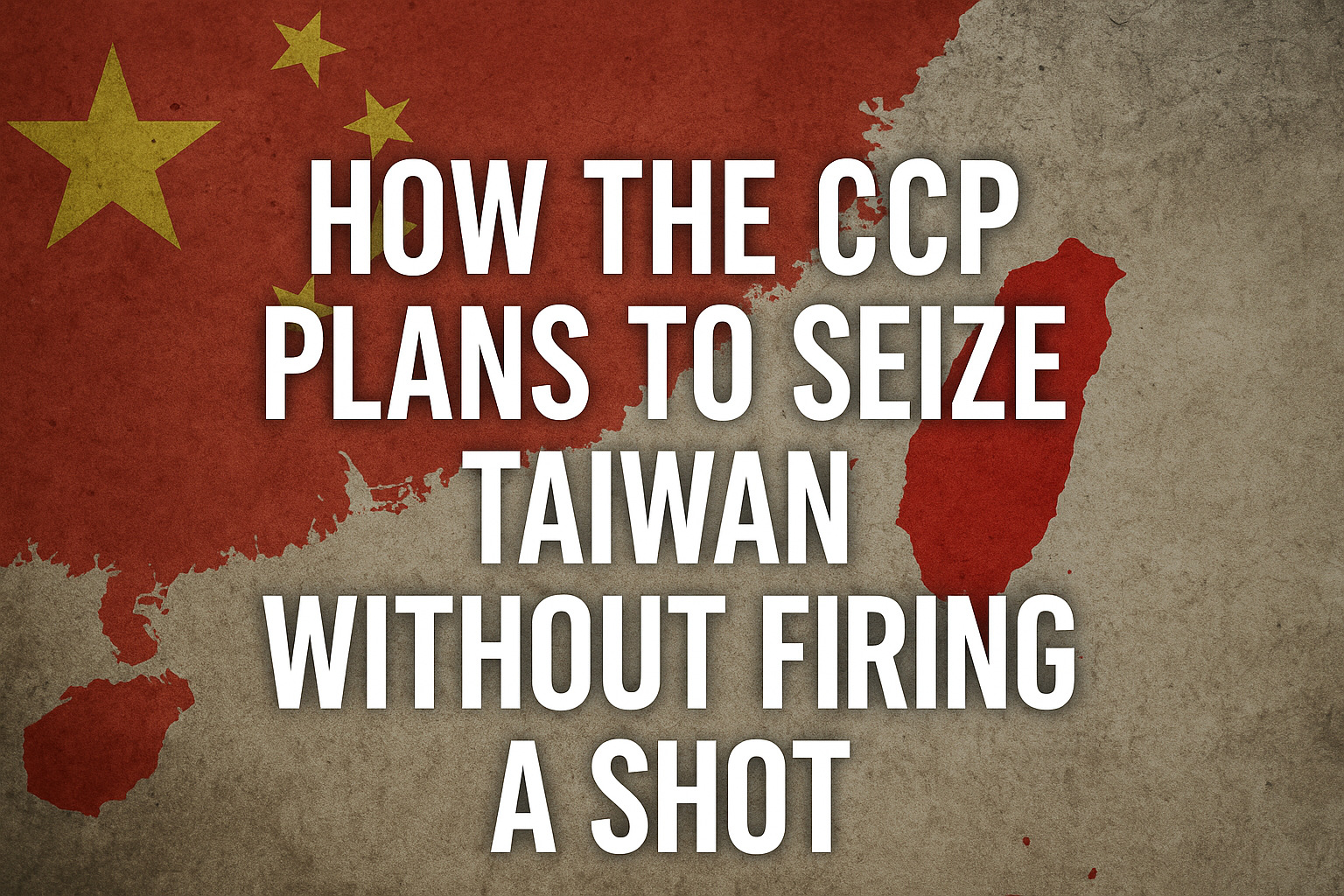The Invasion Without Guns: How the CCP Plans to Take Taiwan from Within
The recent failed recall movement in Taiwan not only reveals cracks in its democratic resistance but also exposes just how deep Beijing’s influence may already run.-Rafael Benavente

How the CCP Plans to Seize Taiwan Without Firing a Shot
By Rafael Benavente
Based on a livestream from Lay’s Real Talk
In the shadow of Taiwan’s democratic process, a darker strategy is unfolding—one that may redefine how nations fall without war. The Chinese Communist Party (CCP), frustrated by diplomatic stalemates and fearful of the costs of military action, appears to be leaning into subversion, infiltration, and political manipulation as the primary tools for annexing Taiwan. The recent failed recall movement in Taiwan not only reveals cracks in its democratic resistance but also exposes just how deep Beijing’s influence may already run.
The Great Recall Movement: A Democratic Pushback That Failed
In early 2024, Taiwan’s opposition Kuomintang (KMT) party gained a majority in the Legislative Yuan with the support of the third-party Taiwan People's Party (TPP). Despite the Democratic Progressive Party (DPP) winning the presidency for a third term, it lacked legislative control. This gridlock soon became a liability.
Beijing seized the opportunity. According to leaked directives, Xi Jinping ordered the United Front Work Department and Taiwan Affairs Office to wield influence through legislative proxies. This effort culminated in the election of a pro-Beijing speaker and the stalling of critical bills—especially Taiwan’s defense budget.
Outraged citizens responded with a mass recall campaign targeting 31 KMT legislators. Hopes were high; the DPP needed to flip just six seats to regain control. But of the 24 legislators up for vote in the first round, none were recalled.
Why the Recall Movement Failed
Lay’s Real Talk points to six reasons:
- Asymmetrical Political Investment: While the KMT mobilized its full machine to block recalls, the DPP remained lukewarm, hesitant to appear partisan.
- Vote-Buying Tactics: The KMT passed generous social programs—wage hikes, welfare boosts, and cash handouts—softening voter resistance.
- Strategic Overreach: Instead of focusing on a few obvious pro-CCP KMT legislators, the recall campaign went after 60% of them, triggering massive pushback.
- Local vs. National Priorities: Many voters saw their legislators as competent on local issues—even if they leaned pro-Beijing.
- Difficult Battlegrounds: Recalls happened in KMT strongholds. The DPP simply lacked the grassroots power to compete.
- Underestimating the CCP’s Infiltration: The biggest factor of all—Taiwanese and Western observers alike misjudged the depth and sophistication of China’s influence operations.

Victor Gao’s Chilling Playbook for a Takeover
Perhaps the most disturbing revelation came from Victor Gao, a Yale-educated former interpreter for Deng Xiaoping and a high-ranking Chinese think tank official. In a July 4th speech at a Chinese university, Gao detailed a non-military plan for taking Taiwan. His proposal: stage a “Second Xi’an Incident.”
In the original 1936 Xi’an Incident, a general detained Chiang Kai-shek and forced him into an alliance with the CCP. Gao envisions a similar move—only this time in Taiwan. His scenario involves:
- Kidnapping Taiwan’s president, William Lai (Lie).
- Declaring a national emergency, inviting mainland “security forces” (PLA troops in disguise) to restore order.
- Issuing decrees banning resistance, ensuring Taiwan’s military and police do not engage.
- Framing the invasion as internal peacekeeping, not foreign occupation.
This strategy would bypass both public resistance and foreign intervention. The CCP would claim legitimacy, and the West—particularly the U.S.—would find itself diplomatically paralyzed.
Infiltration at the Highest Levels
This scenario is not far-fetched. In February 2025, Taiwan quietly arrested Wu Shang-Yu, a long-time DPP insider and senior presidential advisor, as a spy for the People’s Liberation Army. He had been feeding information to Beijing through a network of DPP staffers and couriers who hand-delivered materials to Chinese intelligence.
Other cases followed:
- DPP legislative aides leaked documents in exchange for bribes.
- Military guards and cyber officers filmed and sold sensitive materials.
- Air Force personnel reportedly shared missile data with the Chinese.
Despite the serious nature of these offenses, most received light sentences. Taiwan’s legal system, not recognizing many of the leaks as “classified,” charges spies with corruption—not treason.
The result? A weak deterrent, and an emboldened CCP.
Why This Matters to the World
Lay’s Real Talk reminds us: Taiwan is the only Chinese-speaking democracy. Its fall would send shockwaves through Asia—and signal the global decline of liberal values in the face of autocracy.
Western governments have long underestimated China’s political warfare. While Russia wages kinetic war in Ukraine, China uses corruption, ideology, and subterfuge. The CCP has deeply infiltrated not just Taiwan, but also institutions in the U.S., Canada, Europe, and Australia.
Victor Gao’s plan could work precisely because it bypasses tanks and missiles. It weaponizes political legitimacy and social division.
Lessons from Taiwan’s Missed Moment
The recall movement was a missed opportunity. It showed that even with high voter turnout and public frustration, democracy alone may not be enough to stop authoritarian erosion when the opponent plays by no rules.
What can be done?
- Expose infiltration early. Western media and governments must elevate public awareness of CCP subversion.
- Pass serious counter-espionage laws. Taiwan—and all democracies—need sharper legal tools and harsher penalties for traitorous activity.
- Decouple from China. Financial and technological ties have become liabilities.
- Support Taiwan decisively. Diplomatic ambiguity only emboldens Beijing.
As Lay’s guest Robert Tsao, founder of UMC, said:
“Those who suffer have no right to pessimism. Enduring hardship is in our destiny, but not fearing hardship and courageously pressing forward is our mission.”
Taiwan’s fate is a test for the free world. If we fail to meet it, Victor Gao’s vision might not just be theory—it could become history.
By Rafael Benavente
For a deeper dive into China’s covert strategy in East Asia, don’t miss my article: The Invasion Without Guns: How the CCP Plans to Take Taiwan from Within.
Credits: This blog was inspired by Lay’s Real Talk livestream on YouTube. Transcript provided by tactiq.io.
Translated video referenced from Victor Gao’s July 4 speech will be available on X (formerly Twitter).
Related reading: Taiwan’s Soft Resistance: Lessons from a Failed Recall
